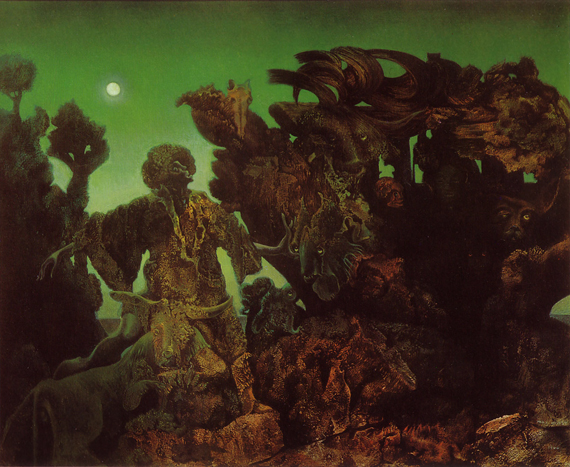 Max Ernst, Epiphany (1940)
Max Ernst, Epiphany (1940)
Whenever desire climbs a tree, internal repercussions trip it up and it falls to its death; the rhizome, on the other hand, acts on desire by external, productive outgrowths. That is why it is so important to try the other, reverse but non-symmetrical, operation. Plug the tracings back into the map, connect the roots or trees back up with a rhizome.
Gilles Deleuze and Félix Guattari, A thousand plateaus: capitalism and schizophrenia.
An emergent thought:
The recognition of the illusion of economic growth is a symptom of a crisis — a self-betrayal of the materiality of capital in the grain-become-visible in the tightly stretched membrane. Crisis relocates idealist and utopian strategies from the hypothetical and fantastic to within the possible, pragmatic and even necessary. It brings the holistic and broad to bear upon the specific, and the local — global ecology becomes tangibly present in everyday negotiations of individuals and small communities. Unexpected regions of the metaphysical materialize as we are forced to perceive the interconnectedness of living beings and the power of cosmologies to inform, motivate and direct human behavior. The neurotic visions of post-apocalypse projected by the philosophies of growth, industry and economic disparity reveal their attractive democratic foundations, the leveling of qualities of life and the rationality becomes evident in post-industrial models. Intrinsic rights of the individual cannot be argued to be dependent upon individualist goals, and it becomes urgently necessary and unavoidable to conceive of communal organizational structures which function as part of a whole. It becomes undeniable that our belief in a better possible future, so necessary to undertake the difficult work of reaching it, is part of a long, intertwining and diverse lineage of holistic beliefs that have always existed and been valuable, yet were not always recognized outside of the codified boundaries of official culture. Essentially, to instrumentalize belief, we assume an analytical (extra-dimensional) vantage, creating in the zone of the singularity — the space in which belief is transformed into objective forces by “necessity” — a probability map of possible positions and trajectories.
I have a sense that we need to, in communities of natural human scale, carefully and analytically revive the historical records of cultural ecologies — the materially conjoined structures of human organization and natural environments — with projected relevance in inverse proportion to their proximity to the epicenters of empires. We have firmly entered the borderlands — the frontline of the conflict between programmatic expansionism and the indigenous, the genesis of synthetic cultures that from the inside appeared occult and mystical and which, in the analytical revival is revealed to be programmed by holistic mythologies. Here and now we will reconfigure the historical syntheses of nomadic federations and city-states. The border is still being pushed outward, but when we look toward the future-past, we can begin to re-imagine practices of ecological existence and experience — formerly maligned as “primitive” and “superstitious” — as praxises arisen from sound, resonant and beautiful theory. Such an analytical retracing becomes a novel progression, taking what once came after with us into what once came before.
Perhaps this precludes an inversion of the deepest sense of deterritorialization. Perhaps this prefigures a recorporation of the imaginary body.